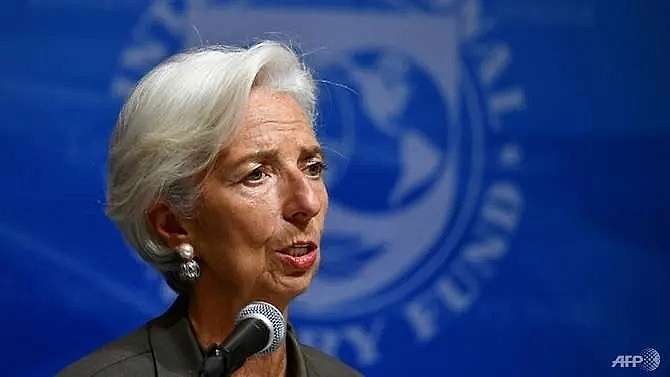'Precarious' global rebound expected in late 2019: IMF's Lagarde
 |
| IMF Chief Christine Lagarde. (Photo: AFP/Kazuhiro Nogi) |
In a speech ahead of next week's spring meetings with the World Bank, IMF chief Christine Lagarde said the world economy was vulnerable to shocks from Brexit, high debt levels and trade tensions, as well as unease on financial markets.
"The expected rebound in global growth this year is precarious," she said in prepared remarks at the US Chamber of Commerce. "This is a delicate moment that requires us to handle with care."
Lagarde said the IMF next week was due to cut its global growth forecasts even further than it had in January, with more than two thirds of the world economy likely to see slowing growth.
At the start of the year, the fund had already lowered its expectations several notches from a prior outlook, calling for global GDP to expand by 3.5 per cent this year and next.
Next week's meetings - a semi-annual Washington conclave of central bankers and finance ministers - comes with the backdrop of fraught negotiations between Beijing and Washington to resolve their eight-month trade war.
Gloom about slowing growth in Asia, Europe and the United States, as well as the protected US-China trade war, have sparked periodic jitters on markets since last year.
But Lagarde pointed to some grounds for optimism, saying major central banks, including the US Federal Reserve, were showing patience about the speed of interest rate increases while China had moved to stimulate its economy.
"These policy responses have supported an easing of financial conditions and increased capital flows to emerging markets, where currencies have strengthened relative to the US dollar," Lagarde said.
She called on member governments to help avert mounting dangers by modernising tax systems, cutting public debts and reducing wealth inequalities through spending on education, health and infrastructure, recommendations the IMF has made before.
Lagarde repeated warnings about imposing tariffs, saying such barriers to trade were "potentially self-inflicted wounds" that threatened to dent economic growth and leave no winners.
But Lagarde also said governments should address the dangers posed by the concentration of market power in the hands of corporate giants, especially in the tech sector, with major players often able to block out competition and garner the lion's share of profits for themselves.
While IMF research showed this concentration had so far had little effect on business investment, production and worker pay, according to Lagarde, there was still a danger that it could.
"I am not saying that we currently have a monopoly problem," she said. "But I am saying that we should take appropriate measures so that it does not become a problem."
What the stars mean:
★ Poor ★ ★ Promising ★★★ Good ★★★★ Very good ★★★★★ Exceptional
 Tag:
Tag:
Related Contents
Latest News
More News
- State corporations poised to drive 2026 growth (February 03, 2026 | 13:58)
- Why high-tech talent will define Vietnam’s growth (February 02, 2026 | 10:47)
- FMCG resilience amid varying storms (February 02, 2026 | 10:00)
- Customs reforms strengthen business confidence, support trade growth (February 01, 2026 | 08:20)
- Vietnam and US to launch sixth trade negotiation round (January 30, 2026 | 15:19)
- Digital publishing emerges as key growth driver in Vietnam (January 30, 2026 | 10:59)
- EVN signs key contract for Tri An hydropower expansion (January 30, 2026 | 10:57)
- Vietnam to lead trade growth in ASEAN (January 29, 2026 | 15:08)
- Carlsberg Vietnam delivers Lunar New Year support in central region (January 28, 2026 | 17:19)
- TikTok penalised $35,000 in Vietnam for consumer protection violations (January 28, 2026 | 17:15)






















 Mobile Version
Mobile Version